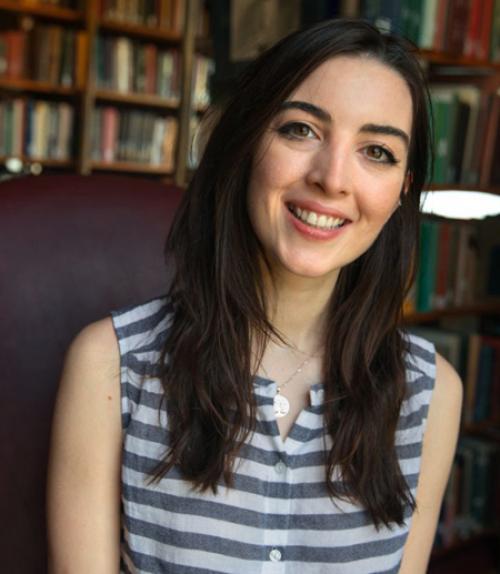As a Fulbright scholar at Cornell this year, Rebecca Macklin deepened her research through engagement with Native American communities, including joining Cornell students in educational outreach to indigenous high school students.
A doctoral student in comparative literature at the University of Leeds in the United Kingdom, Macklin came to campus as a 2017-18 Fulbright visiting student researcher, affiliated with the Department of English and the American Indian and Indigenous Studies Program (AIISP).
When she received the Fulbright last year, Cornell was the best institution suited to her research interests for a number of reasons.
“It was really important to me to go somewhere with a specific program in American Indian and Indigenous Studies, an adviser who was interested in my work, and a place that has real connections with indigenous communities,” she said. “It is important that research is produced in dialogue with communities. It’s a real problem for indigenous studies scholars in the U.K. where you are so far removed from the people.” She added: “Cornell has a great program.”
Since arriving at Cornell last September, Macklin worked in a weekly tutoring program led by AIISP at Lafayette High School in Nedrow, New York.
Tutoring the Onondaga students in writing “has been fantastic,” she said during Cornell’s last week of classes. “Working that length of time with the students, I got to know them very well. I also organized additional sessions with the school to have more time with the students.”
She credited Asa Shenandoah, the school’s Native American liaison, and Onondaga Nation School dean of students Simone Thornton with “helping me with the history and the culture, and understanding the issues that these kids are facing.”
She saw benefits in working directly “with students, rather than elders or community leaders,” she said. “Any Cornell student can take part in the tutoring program. I’ve been encouraging other grad students to get involved. Student participation is very central to the program, and it’s great for both Cornell students and Onondaga students.”
She also volunteered for AIISP in welcoming visiting native students to campus from across the country at a “Promising Futures” event this spring.
Her adviser is Eric Cheyfitz, the Ernest I. White Professor of American Studies and Humane Letters. “Eric has been very enthusiastic about my work; there is a lot of crossover with his research as well,” she said.
“I feel honored that Rebecca chose to spend her Fulbright year working with me at Cornell,” Cheyfitz said. “She is doing important work in comparative indigenous studies and has a deep commitment to the field, not only as a scholar but as an activist.”
Macklin gave a talk at an AIISP symposium in April, examining the connections between tourism and literature as “cultural contact zones” and spaces of resistance in Thomas King’s 1999 novel “Truth and Bright Water.” The symposium also featured Iris Plessius, a visiting Fulbright scholar with AIISP and doctoral candidate at Radboud University in the Netherlands.
“I’ve been able to take classes, which has been valuable for me … to develop my knowledge and understanding in a more formal environment,” Macklin said. “In the Ph.D. program in England, coursework is not part of it.”
She took an Africana studies graduate seminar in visual and literary culture with Carole Boyce Davies and an indigenous critical theory seminar with Carol Warrior, “one of my main academic mentors – she has been very generous with her time,” Macklin said.
She also worked with comparative literature faculty members Naminata Diabate and Natalie Melas, and Elizabeth Anker, who has faculty appointments in law and English.
“My work is completely interdisciplinary, so this blend of studies has really complemented my research. I’ve been blown away at how generous everyone has been in this town, every person has been excited to meet with me,” Macklin said.
Macklin’s undergraduate studies were in English literature; her current research interests also include trans-indigenous studies, postcolonial theory and biopolitics. Upon returning to the U.K. in July, she will spend one more year on her doctoral thesis, which explores globalization and resistance in indigenous and world literatures, with a focus on contemporary Native American and South African fiction.
This story also appeared in the Cornell Chronicle.




